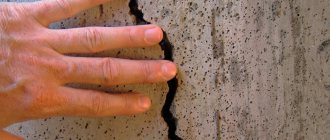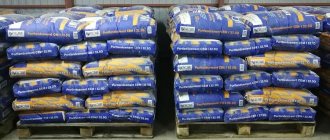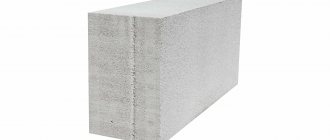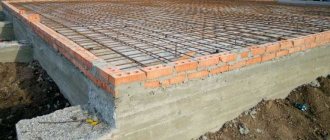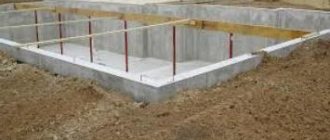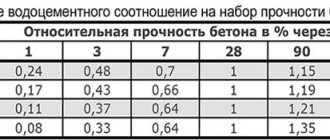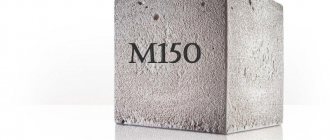Who needs a concrete certificate?
A concrete certificate is a permitting document on the quality of a state-standard concrete mixture
Issued by the certification body after confirmation of compliance with established quality standards - GOST, SNiP and TU. The certificate confirms the quality of the building material, making it competitive and in demand on the market.
Concrete - a building material based on water, cement, sand and crushed stone with the addition of various types of additives and impregnations - is not required to be certified by law. But if the manufacturer wants to export or participate in tenders, he cannot do without a certificate. Concrete products are also subject to mandatory certification.
The validity period of the certificate of conformity for concrete mixture (concrete) is 3 years.
The need to declare concrete
Construction mixtures classified by OKPD2 codes 23.63.10.110 and 23.64.10.110, which include ready-mixed concrete, are subject to mandatory declaration of conformity for compliance with GOST 7473-2010 and GOST 28013-98 with subsequent receipt of a declaration of conformity with GOST R.
The declaration confirms the product’s compliance with mandatory safety requirements, and the voluntary certificate confirms compliance with the requirements established by the applicant. The difference between a declaration and a certificate is that there are no separate forms for declarations; the document is drawn up on white A4 paper without security marks according to the form established by the Decree of the State Standard of the Russian Federation dated March 17, 1998 No. 12.
Important! Voluntary certification is carried out at the request of the supplier and does not cancel the mandatory conformity assessment, which is the declaration of conformity.
Quality passport
Certificates of conformity for concrete and mortar
Registration of a certificate for concrete
Re-registration
Prices
Quality of ready-made concrete (concrete passport).
When producing ready-mixed concrete, the manufacturing organization is required to issue a document confirming the quality of the concrete produced. When purchasing ready-made concrete in accordance with clause 4.15.2 of GOST 7473-94, each batch of the mixture sent to the consumer must have a quality document (practically a quality passport for concrete).
The form of the document on the quality (passport) of the concrete mixture is specified in Appendix G of GOST 7473-94:
DOCUMENT ON THE QUALITY OF CONCRETE MIXTURE No. ______
Name of the manufacturer ________________________________________________ Address, telephone, fax of the manufacturer ___________________________________________
Consumer ________________________________________________________________
Type of concrete mixture and its symbol ___________________________________ Workability of the concrete mixture at the manufacturing plant and at the place of installation, cm (c)_____________________________________________________________________________ Number of the concrete mixture composition ________________________________________________ Mark of conformity (in the case when the concrete mixture is certified to meet the requirements of the standard) ___________________________________________________ Date and time of dispatch concrete mixture __________________________________________ Class (grade) of concrete in terms of compressive strength at age __________________________ Other quality indicators (if necessary) ________________________________ Coefficient of variation in concrete strength, % _____________________________________
Required concrete strength, MPa (kgf/cm2) _____________________________________
Design grade for average density (for lightweight concrete), kg/m3 _________________ Coefficient of variation of average density, % ___________________________________
Name, weight (volume) of additive, kg (l) ____________________________________
Class of materials according to the specific effective activity of natural radionuclides and digital value Aeff, Bq/kg _______________________________________________ Largest filler size, mm ________________________________________ Issued “__” ___________________ 199_ Head of the workshop (foreman) _____________________ F. and. O. Head of laboratory _____________________
F. and. O.
When purchasing ready-mixed concrete, be sure to take a passport (quality document) for the concrete and keep it. In the future, in the event of various disputes/construction examinations, such a document may be extremely necessary.
podomostroim.ru
Types of certification and concrete quality certificate
Quality certificate for concrete
The supplier of concrete products (a person or organization that has a supply agreement with the consumer) is obliged to issue the buyer a quality certificate for each batch. The passport reflects the following characteristics of the building mixture:
- product lot number;
- details of the manufacturer, seller and buyer;
- Shipping date;
- type of concrete;
- its compliance with a certain GOST;
- strength class;
- information about the filler and mixture composition.
- Products can only be exported if there is a certificate;
- Participation in a state tender, when applying for participation in which you must attach a certificate of conformity.
The concrete quality certificate is certified by the manufacturer’s seal and the signatures of the responsible persons.
The passport confirms the quality of the material and compliance with the declared standard, and also, in the event of a conflict situation, relieves the developer of responsibility for the insufficient strength and durability of concrete structures due to the low quality of the concrete mixture.
Responsibility for the quality of the commercial mixture - a building material supplied in a plastic state by persons or organizations that are not final consumers - lies with the manufacturer!
Grade M500 and higher involves the preparation of concrete mixture directly on the construction site - that is, at the construction site by the work manufacturer for his own use. In this case, the developer must adhere to the attached instructions for preparing a mixture of a given quality and complying with SP 82-101-98.
Voluntary certificate
In the Russian Federation there is no mandatory quality certification for the production of concrete mixtures, but voluntary certification cannot be avoided in the following cases:
It is necessary to clarify that the applicant himself determines the criteria for evaluating products during voluntary certification. But you should know that on the basis of Rosstandart Order No. 2-Art dated January 14, 2020 “On the suspension of the validity of national standards of the Russian Federation” until January 1, 2022, it is impossible to certify according to the standards from this list.
Certificate in the form of QMS
The certificate of conformity received in confirmation of compliance with the requirements of the ISO 9001 series standards for the enterprise's quality management system is confirmation of the high quality of the products of a particular construction industry and its compliance with international requirements.
A quality certificate for concrete in the QMS form can be issued for a period of up to 3 years, subject to an annual audit of the enterprise by a certification center. The presence of such a certificate for a concrete mixture increases the demand for it not only on the Russian market, but also for export.
Sanitary certificate
A sanitary and hygienic certificate means an expert opinion from Rospotrebnadzor. You need to obtain this document if the manufacturer is releasing a concrete mixture to the Russian market for the first time. In other words, all new brands of concrete mixtures must have an expert opinion from Rospotrebnadzor. This requirement is due to the fact that the building material includes various natural and synthetic components that should not contain radioactive substances.
The validity period of the expert opinion regarding concrete mixtures has not been established. In other words, this document will be valid throughout the entire production period.
Documents and forms for certification of concrete and concrete products
| Application form for obtaining a certificate for concrete mixtures | Form for certification of products in the GOST R system | Form of document on the quality of a concrete mixture of a given batch quality | Form for issuing a document on the quality of a concrete mixture of a given batch composition |
Data on a concrete mixture of a given composition and quality after the necessary tests are entered into a standard passport form approved by GOST 7473-2010.
The passport is issued only for a batch of a certain brand or class of concrete. The quantity and type of additional additives and the radioactivity of the material must be indicated.
To obtain a certificate in accordance with GOST R, the applicant fills out an application for certification in the established form:
The applicant can only be a concrete manufacturer - a legal entity or individual entrepreneur registered in the territory of the EAEU. The application must indicate the manufacturer’s details, description and characteristics of the building material, HS codes and OKPD2. Since certification is voluntary, the customer himself decides according to which standards or technical conditions he wants to assess the conformity of his products. For example, this may be in compliance with GOST 7473-2010 for concrete mixtures and GOST 25820-2000 for lightweight concrete.
For each standard, various indicators of the quality and safety of the mortar are defined, for compliance with which specialists from the testing laboratory will check the prototype.
In addition to the application, the accredited certification center must provide:
- Copies of constituent documents (OGRN, INN, statistics codes, charter, extract from the Unified State Register of Legal Entities/Unified State Register of Individual Entrepreneurs);
- Information about previously issued certificates;
- TU, GOST and other regulations adopted in the production of concrete;
- Definition and technical description of the solution (for example, gypsum-alumina expanding concrete is produced according to GOST 11052-74 and belongs to group Zh12);
- Copies of the supply contract or invoice, if available.
Is concrete certification required?
The consumer wants to be sure that he is purchasing a high-quality and safe product that has passed all tests and meets the declared parameters - as evidenced by the mandatory GOST R certification.
But with concrete the situation is somewhat different. In Decree of the Government of the Russian Federation No. 982, which contains groups of goods requiring certification or declaration according to GOST R, concrete is not specified. There are no technical regulations in the Eurasian Union obliging concrete to be certified. It turns out that its certification is not mandatory and it is permissible to sell this building material in Russia and on the territory of the EAEU without permits. Why then do large manufacturers certify their products? There are reasons for this.
Get a free consultation
Certificates of conformity for concrete and mortar
For concrete mixtures BSG (ready-made), a certificate of conformity is issued subject to compliance with the technical conditions in accordance with GOST 7473-2010 and GOST 28013-98. Regardless of whether the manufacturing company plans to certify concrete or not, it must follow these standards when producing it. Compliance with these and other related standards is verified by testing the mortar in a testing facility.
Certificate for concrete grades M100, M150, M200, M250, M300, M500
The grade of concrete is a key criterion for determining quality for the customer. The remaining parameters - water resistance, frost resistance and mobility - are directly dependent on the brand.
BSG concrete mixtures have the following compression grades: M50; M75; M100; M150; M200; M250; M300; M350; M400; M450; M500; M600; M700; M800; M900; M1000. The higher the grade, the greater the percentage of cement in the concrete mixture. For example, M100 concrete is excellent for screeding (including cement-sand) floors, and M1000 is used in the construction of spaceports.
The certificate of conformity must indicate the grade of concrete.
For example, for M200 concrete, the certificate of conformity will imply an average strength of 19.65 MPa or 196 kgf/cm², so this grade is used for the foundations of low-rise buildings and small stairs.
In addition to certain brands of mixture, concrete can be:
- specified quality: the required properties and additional characteristics of the building material are specified to the manufacturer;
- specified composition: the composition of the concrete mixture and the components used in its preparation are specified by the manufacturer;
- of a given standardized composition: concrete of a given composition, which is defined by a specific standard or technical document (for example, production standards).
Heavy concrete must be manufactured according to the technical specifications of GOST 26633-2012, which are included in the quality passport and certificate of conformity. In addition, the quality and safety of cement in the construction mixture must comply with GOST 30515-2013.
Certificate of conformity for concrete for strength class B15, B20, B25
Along with the concept of concrete grade, the term concrete class is widely used in construction. The difference between these concepts is that if the brand is an average indicator, then the class implies guaranteed compliance with the specified level of strength. The concrete class represents the declared strength of concrete in MPa with a probability of 0.95 and can have the following values: B1; B1.5; AT 2; B2.5; B3.5; AT 5; B7.5; AT 10 O'CLOCK; B12.5; B15; IN 20; B25; B30; B35; B40; B50; B55; B60.
For example, a certificate of conformity for concrete B15 means that such a mixture belongs to the heavy class B15 M200 and tests to determine the strength class of concrete are carried out in accordance with GOST 10180, GOST 25192-82, GOST 26633-2012 and ST SEV 1406-78. Likewise for the certificate for concrete B25 M350 and others.
Stages of obtaining a concrete certificate
Certification of concrete, regardless of its type, takes place in several stages:
- The applicant applies to an accredited certification center, submits an application for confirmation of conformity, copies of his registration documents and product documents.
- Center employees check the provided documents, after which they approve the decision to carry out certification work and develop a scheme for compliance with the stated standards.
- Selection of concrete mixture samples for research in the testing laboratory of the center.
- Direct examination of the product, confirmation of its characteristics declared by the manufacturer. The test result is recorded in the test report.
- Making a decision by an accredited certification center to issue a certificate of conformity or refuse.
After successfully completing the certification stages and making a positive decision, the certification company issues the applicant a concrete quality certificate and submits the data to Rosreestr.
Hassle-free concrete certification
Experts will help you choose the best supporting document for your case. If you value your reputation and want to be one step ahead of your competitors, contact the specialists!
- For more than 10 years, we have been providing assistance in mandatory certification and declaration of conformity.
- We will help you prepare the necessary documents or simply take all the decisions upon yourself.
To do this, call the phone number listed on the website, write an email, or simply fill out the feedback form.
Prices and calculation of the cost of a concrete certificate
The cost of undergoing turnkey concrete certification at SK Certificate LLC is from 30 thousand rubles.
Cost of services for certification of concrete products:
The price for testing concrete products in a testing laboratory with the issuance of a test report is from 10 thousand rubles.
Voluntary certificate of conformity for 1 year - 8,000 rubles;
Voluntary certificate of conformity for 3 years - 12,000 rubles;
Certificate of conformity GOST R from 12,000 rubles;
Fire certificate from 35,000 rub.
Declaration of the Customs Union from 7000 rubles.
We help with obtaining a quality certificate; prices are calculated for each batch of goods separately.
Certification specialists from our center will help you calculate the final price for certification of your type of concrete mixture.
Re-issuance of a certificate
To reissue a certificate, the applicant must contact the certifying authority. Replacing a certificate without testing is possible if an error or typo was discovered in the certificate, or there was a change in the manufacturer or product data (if the change did not affect the technical characteristics of the concrete mixture).
If there is a change in the composition of concrete, its type, or characteristics, then the previously issued certificate will no longer be valid for the product. For any new product, certification is only possible through testing and research in a laboratory.
In what cases is a certificate not needed?
A concrete certificate is not required for those manufacturers who do not intend to participate in tenders and export their products. For such products, a passport for the concrete mixture will be sufficient.
In addition, if a supplier does not want to undergo voluntary certification for concrete, but wants to close all questions about the legality of production and supply of concrete, then he can contact an accredited certification center for an information (waiver) letter. This document confirms that the concrete mixture does not fall under any technical regulations of the EAEU and is not included in the list of products of RF PP No. 982.
Voluntary certification of concrete: types of supporting documents
Voluntary certification involves confirmation of compliance with current GOST standards or registered manufacturer specifications. It is important to select the current standard for the certified mixture:
- 24211-2008 for additives for concrete mixtures and other mortars;
- 26633-2015 for heavy and fine-grained compounds;
- 7473-2010 for concrete mixtures.
Get a free consultation
Standards require different indicators of the quality and reliability of the mixture.
GOST as an option
The certificate in the GOST system is valid for 3 years. During this time, the organization can use the document to:
- promoting concrete with increased strength and wear resistance on the market;
- participation in tenders for the supply of products to budgetary organizations;
- carrying out advertising campaigns.
Quality Management Certificate
The introduction of a quality management system, as one of the trends in the modern market, distinguishes the manufacturer from competitors in its segment. Assessing the conformity of the QMS involves the use of ISO standards or their analogues from the GOST R system.
Expert opinion
The expert opinion confirms the mixture’s compliance with sanitary and hygienic standards and its safety for humans and the environment. Sanitary control is a mandatory procedure for concrete with special additives.
Rejection letter
The information (refusal) letter is a confirmation that the products are not subject to the regulations of the EAEU and are not included in the list of products of the RF PP No. 982. The document is required when registering at customs and is an advantage when passing inspection checks.
Get a free consultation
To obtain a waiver letter, laboratory examinations and measurements are not required. It is necessary to prepare documents describing the product, indicate its name and HS codes and OKPD2.
Answers on questions
Is it possible to undergo concrete certification remotely?
Yes, it is not difficult to order a permit from the Insurance Company Certificate without personal presence. Clients are consulted in any convenient way, and documents and product samples for testing are delivered by courier service.
What type is sand concrete and how to get a certificate for it?
Sand concrete belongs to fine-grained concrete; GOST 26633-2012 is used to compare its characteristics with standard ones. Products are not subject to mandatory certification; there are currently no EAEU technical regulations for concrete. Voluntary certification is carried out by an accredited certification body at the request of the manufacturer.
What grade of concrete is used for the construction of country houses?
Concrete grades M250 and M300 are best suited for the foundations of large private residential buildings. Brand M300 is used for pouring the foundations of cottages with a height of up to 5 floors. Concrete grade M300 is the first in strength, which is recommended for use for monolithic floors.
What is “cold” concrete and what standards must it meet?
“Cold” concrete is concrete made with an antifreeze additive that constantly hardens at subzero temperatures. Additives for concrete and mortars are regulated by GOST 24211-2008 and GOST 30459-2008; the certificate can indicate compliance with this criterion.
Declaration for concrete mixtures: is it possible to choose instead of voluntary certification?
In contrast to the declaration of conformity, the legislation of the Russian Federation assumes both mandatory and voluntary nature of certification. The declaration must be completed for various products in accordance with one or another technical regulation or standard. Construction mixtures classified by OKPD2 codes 23.63.10.110 and 23.64.10.110 are subject to mandatory declaration of conformity. At the same time, a voluntary certificate does not replace the requirement to confirm compliance by declaring,
Advantages of obtaining a concrete certificate from SK Certificate LLC
“SK Certificate” is a certified certification body with its own testing laboratory;
Business-friendly. Certification of your concrete on a turnkey basis in Moscow in 1 working day with entry into the register;
We prepare all types of permits for concrete and reinforced concrete products;
The company's engineers and lawyers will advise and help with the certification of concrete products.
Flexible pricing policy - when ordering accompanying certificates, a discount is provided (concrete and cement)!
Ordering certification from us is a guarantee of results and the success of your business
Certificates issued by our clients
Advantages of contacting the AFM center
The ASM Certification and Permitting Center is aimed at competent work with the client. Orders are carried out by professional specialists with many years of practical experience. When collaborating with the client, they provide support. You will be able to get a free consultation, as well as assistance in collecting and preparing a package of documents. We can carry out all certification work on a turnkey basis or provide a one-time service. It is important to us that our clients remain satisfied.
<< Silicate paint certificate
Certificate for crushed granite >>
